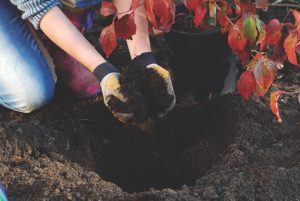
c.Martin Mulchinock
This year I am actively planting for hope. I’ve decided that the only way to offset all the doom and gloom on the news is to make small but powerful steps that will make a difference not just to me but to the garden and the greater environment too.
Focus on the positives
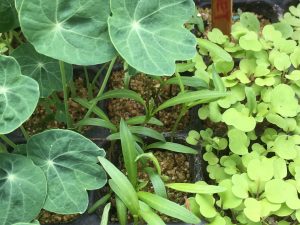
c. Jean Vernon
Everything we do, every action has a reaction, so doing something positive is very powerful. As gardeners we are blessed with the resources and the knowledge of the magical world of nature, plants and gardening and if we have somewhere to grow we are very rich indeed. Those with a greenhouse are the richest yet, because we have the ability to stretch the seasons, manipulate plants to perform better, stronger and longer and then make a real difference to so many other things. Gardens grow hope. Every time we sow a seed, take a cutting or plant something new it’s the first step of a new life, something to look forward to and an act that shows faith in tomorrow, or more simply just hope.
But we don’t do it blindly; we garden with hope for the planet, we garden in tune with nature and for the highest good of all. Or most of us do, or at least I hope we do.
All the RRRRRRRRs
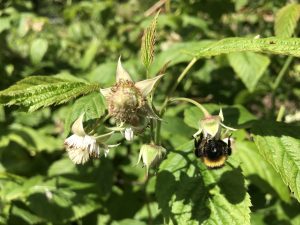
c. Jean Vernon
Recycle, Re-use, Repurpose, Reduce, and even Refuse are the buzzwords that reflect ways that we can support and Recreate sustainable routines in the garden. And those are a great start and words that we all understand. As gardeners we already Recycle in our compost bins, turning ‘waste’ into wonder. We Re-use our ‘old’ flowerpots, we Repurpose old containers into seed trays and planters and many of us save our seed, take cuttings and share our surplus. We Reduce our Reliance on supermarkets; we Reduce our footprint on the planet. Most of us have Reduced our use of chemicals and other shop-bought commodities. We Refuse to accept the new trend of fake grass, fake plants and instead turn to nature for example, inspiration and nurture.
Our gardens help provide by growing ingredients for our menus, healing salves and herbal infusions that nourish and Repair our health. But we need to extend that Repair thinking to as much as we can; To our tools, to our clothing to our mental health and wellbeing. Our gardens and all they contribute to our lives envelop us in nature, they nurture our mental health and they stimulate our creativity. We have a Responsibility to nurture our environment and help it heal. If we can do that in our plots we can then extend it out to our lives and beyond, sharing the positivity and Restoring the balance.
Power plants
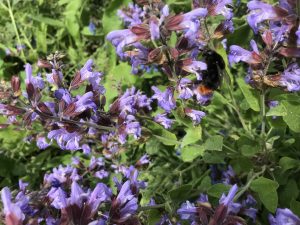
c. Jean Vernon
There are so many ways to do this; when planting or planning to plant this season choose plants that work harder. Plant things that perform in different ways, think about what role they play in nature as well as their benefits aesthetically and as edibles. Choose plants that offer natural food for wildlife, not just fruit, berries, seeds, hips and nuts but pollen and nectar for our insect friends too.
Let’s plant fruit like apples and pears, cherries and plums that produce beautiful blossom in spring, loaded with pollen and nectar creating virtual magnets for early emerging bumblebees and solitary bees, the power pollinators in the garden. If you don’t have room for trees, plant raspberry canes and currants, the nectar rich flowers will feed the pollinators and provide delicious fruit for your family.
Plant more herbs but let some of the stems flower. Herb flowers are particularly important for pollinators, offering self-medicating opportunities with their healing powers. Research has show that bumblebees will forage on healing thyme flowers when suffering from fungal infections. Herbs are fantastic plants for us too, offering powerful tastes and flavours for our menus, but also medicinal powers and cosmetic uses too.
Power gardening for the planet
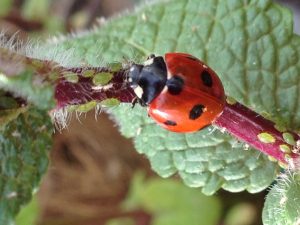
c. Jean Vernon
When we start to really think about how we garden and alter our actions to be more inclusive and supportive of biodiversity of all kinds then our gardens become healthier. There are so many things you can do that will really make a difference. Probably the most powerful move is to dump the toxins. They have no place in our gardens. By killing things we perceive as pests we are depriving other creatures of a food source and eventually we unbalance the natural balance. Nature does move in when there is a flush of one thing or another because this is a feast for a predator like a garden bird, a hedgehog or even a wasp.
We need to look after the little things and to remember that our plants are the base layer of the food chain, so they can and will be eaten. We need to care for the soil by mulching and conditioning with leaf mould and homemade garden compost.
Ten power moves for your garden
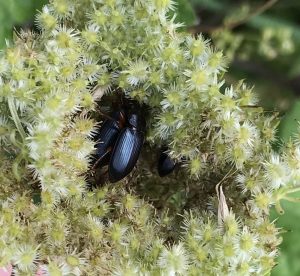
c. Jean Vernon
- Remember to choose plants that have open accessible flowers for fast food for pollinators. Consider the shape of the flowers so that long tongued moths and bees can access the nectar
- Include a few plants with hollow stems that beetles, solitary bees and wasps can nest in.
- Choose flowers that make seeds for wildlife. Make sure that your plants that flower in succession.
- Keep growing new things but choose plants that work harder. So if you love a posy of flowers in the kitchen grow some that you can pick. When the flowers are past their best put them in a jam jar of water outside so that the insects can feed on any pollen and nectar and the birds can find any seeds.
- Think about habitat and nesting sites, places that provide shelter too. Hedges and mixed planting, established crowns of perennials and tussocky grass all provide hidey-holes for wildlife.
- Choose plants that self-seed so that they fill the gaps in your borders with flowers and more plants.
- Choose native plants that provide larval food for the butterflies and moths. Be more tolerant of ‘weeds’.
- Let the grass grow longer so that the leaves provide larval food for moth larvae and the lawn flowers can bloom and offer more food for pollinators.
- Feed the soil with organic matter so that it provides slow release nutrients, improves drainage and supports the soil microbes and mini beasts.
- Recycle everything you can by composting organic material, leaves, kitchen peelings, cardboard, and prunings. Let it compost down and then apply it as a mulch in winter so that it feeds the soil and offers food and protection to the ground dwellers like centipedes, worms, woodlouse, earwigs and other garden minibeasts.










